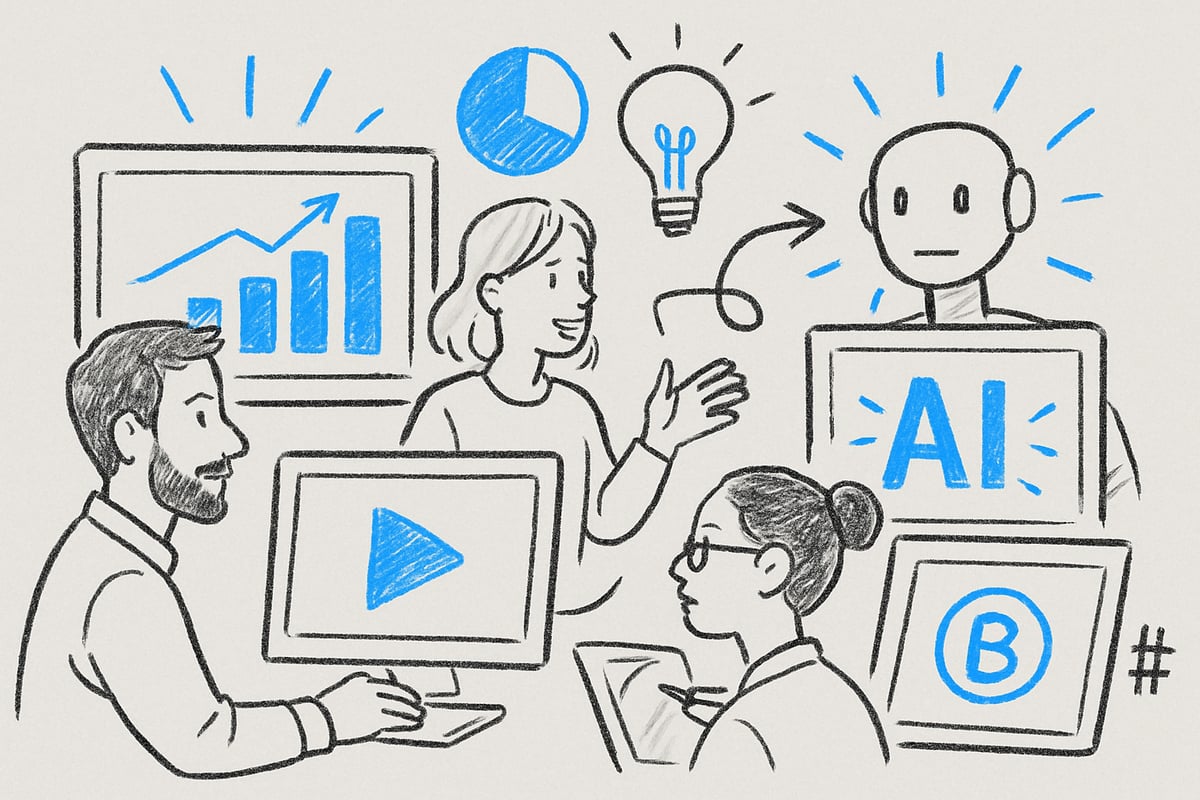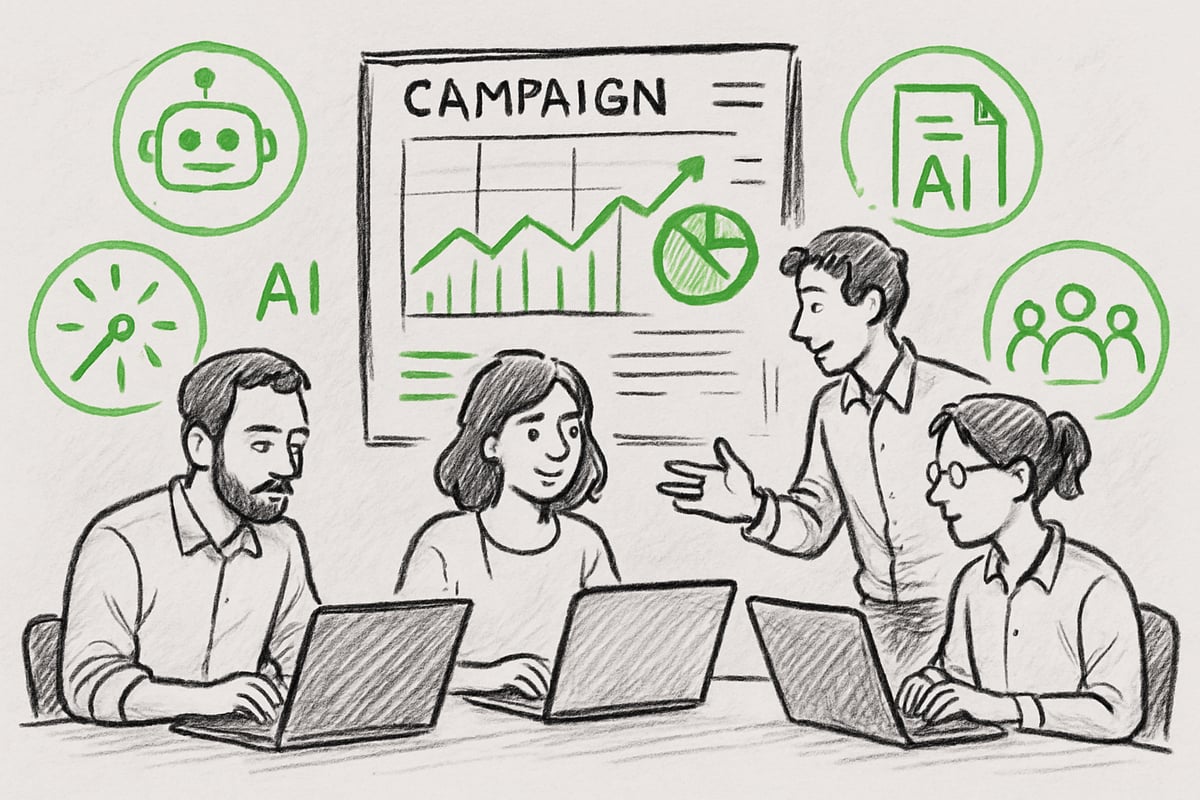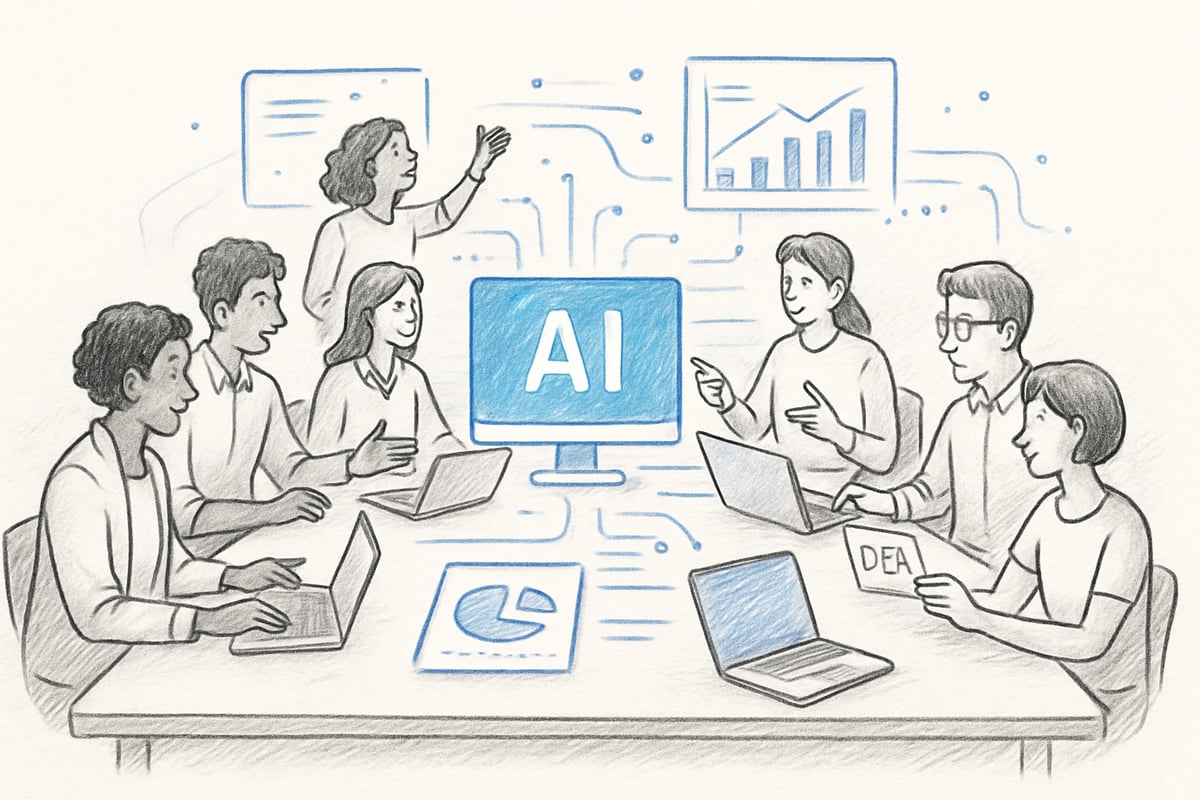The world of marketing and ai is evolving at a remarkable pace, with 2025 set to be a transformative year. Marketers now stand at a crossroads, challenged to innovate faster and reach larger audiences than ever before.
AI is emerging as the driving force behind creative intelligence, brand innovation, and increased operational efficiency. For those ready to adapt, the potential to unlock new value is immense.
This guide will show you how marketing and ai are working together to spark innovation. Explore the current landscape, discover top trends for 2025, and learn how to build skills, apply strategies, and ensure responsible AI use in your marketing efforts.
The State of Marketing and AI in 2025
The landscape of marketing and ai in 2025 is experiencing rapid transformation. Marketers are adapting to new expectations for speed, scale, and measurable results. AI is now central to this evolution, driving innovation across every channel and campaign.

The Evolving Marketing Landscape
In today’s environment, marketing and ai are inseparable forces shaping the industry. The pressure for faster results and greater impact is higher than ever. Marketers are leveraging AI to automate tedious tasks, freeing up time for strategic thinking and creative ideation.
Consider how AI-powered campaign optimization is quickly becoming the norm. Automated systems now analyze vast datasets, adjusting targeting, creative, and budget allocation in real time. This shift is enabling teams to achieve higher ROI and deliver more personalized experiences.
Key transformations in 2025 include:
- Integration of AI across both digital and traditional channels
- Automation of manual, repetitive work
- Data-driven decision-making at every stage
According to recent trends, marketing teams are reclaiming valuable hours for strategy and innovation. Importantly, marketing and ai are not about replacement. Instead, AI is amplifying the creative and strategic capabilities of marketers. For a deeper dive on this evolution, explore the AI for Marketing Guide.
Creative Intelligence: The Human-AI Synergy
The synergy between marketing and ai is redefining what creativity means in the digital age. By blending machine efficiency with human intuition, marketers are achieving unprecedented outcomes. Rather than relying on repetitive prompts, teams are now training AI to “think like a marketer.”
AI tools support brainstorming, content creation, and campaign ideation. For example, AI can generate draft content, which is then refined by human experts to ensure brand authenticity and resonance. This process enhances productivity without sacrificing originality.
Key areas where human-AI collaboration shines:
- Content brainstorming and ideation
- Drafting copy for multiple platforms
- Analyzing campaign data for insights
Despite these advancements, human oversight remains essential. Marketers provide the critical judgment needed to maintain relevance, adapt to shifting trends, and ensure each message aligns with the brand’s unique voice. As a result, the partnership of marketing and ai unlocks new creative possibilities while keeping brand storytelling at the forefront.
Brand Innovation and Integrity
As organizations push the boundaries of what’s possible with marketing and ai, they are also navigating the need for responsible innovation. Balancing AI-driven experimentation with the protection of brand identity is a top priority.
Leaders play a pivotal role in guiding the responsible adoption of AI. They establish frameworks to safeguard integrity while encouraging innovation. For example, brands are harnessing AI-powered personalization to create tailored experiences, all within strict brand guidelines.
Table: Balancing Innovation and Integrity
| Priority | AI Application | Safeguard |
|---|---|---|
| Brand Consistency | Automated content generation | Human review process |
| Customer Trust | Personalization algorithms | Data privacy controls |
| Growth | Real-time campaign analytics | Ethical governance |
Recent insights highlight the importance of responsible use in high-stakes environments. As marketing and ai continue to evolve, organizations must ensure transparency, fairness, and compliance. By doing so, brands can harness AI to drive innovation while upholding the values that set them apart.
Key AI Trends Shaping Marketing in 2025
The landscape of marketing and ai is rapidly evolving, setting the stage for unprecedented innovation in 2025. As organizations seek new ways to engage audiences, several AI-driven trends are becoming essential for staying competitive. Let’s explore the five key trends shaping the future of marketing and ai.

Rise of Generative AI in Content Creation
Generative AI is transforming how marketing and ai come together to produce fresh, on-brand content at scale. Marketers are now leveraging AI to automate the creation of copy, images, and even videos, making it possible to personalize campaigns and respond to trends instantly.
For example, automated social media posts and ad creatives are now generated in seconds, freeing up creative teams to focus on strategy. The adoption of AI-powered image and video generators continues to rise, as highlighted by recent AI Marketing Trends in 2025 reports. This shift allows brands to maintain relevance and consistency while scaling their content production.
AI-Powered Personalization and Customer Experience
The synergy between marketing and ai enables brands to deliver hyper-personalized experiences at every touchpoint. By leveraging predictive analytics, marketers can anticipate customer needs and behaviors, tailoring messages that resonate on an individual level.
AI-driven product recommendations are now increasing conversion rates, as these systems learn from real-time data and adjust offers accordingly. However, successful personalization also requires a careful balance with privacy and data ethics, ensuring customers feel valued, not surveilled.
Automation of Campaign Management and Optimization
Campaign management is being revolutionized by marketing and ai through intelligent automation. AI now handles campaign setup, targeting, and budget allocation, allowing for agile response to market changes.
With real-time performance monitoring, AI tools can dynamically adjust ads based on user engagement, maximizing ROI. Marketers benefit from automation by focusing more on strategy and less on manual tasks, making campaign execution faster and more efficient.
Enhanced Data Analysis and Insights
One of the most significant benefits of marketing and ai is the ability to analyze massive datasets for actionable insights. AI-powered dashboards now visualize campaign performance, enabling marketers to make informed decisions quickly.
Features such as "Magic Insights" provide instant access to trends and patterns that would be impossible to detect manually. This level of analysis ensures that every campaign is data-driven and continually optimized for success.
AI Literacy as a Competitive Advantage
In 2025, teams with strong AI literacy will lead the way in marketing and ai innovation. Upskilling marketers to work alongside AI tools is now a strategic priority for forward-thinking organizations.
Training programs focused on AI prompt engineering and practical applications empower teams to unlock new creative and operational efficiencies. As a result, organizations that invest in AI literacy are better positioned to adapt and thrive in the evolving marketing landscape.
Practical Applications of AI in Modern Marketing
Artificial intelligence has become a core driver for innovation in marketing and ai, transforming how campaigns are created, targeted, and measured. Modern marketers are leveraging AI-powered tools to streamline processes, personalize experiences, and gain deeper insights into customer behaviors. The following sections explore the most impactful applications of AI in today's marketing landscape.

AI-Driven Content Creation and Curation
Marketing and ai now go hand in hand when it comes to generating high-quality content at scale. AI-powered platforms can draft blog posts, product descriptions, and automated email campaigns tailored to specific audiences. These tools also curate relevant articles, videos, and infographics for various segments, saving marketers significant time.
For example, AI can suggest trending topics, generate creative visual assets, and even optimize headlines for engagement. Teams can refine these AI outputs, ensuring the final content aligns with brand tone and messaging.
To explore leading solutions, see the Top AI Tools for Marketers, which showcases platforms for content generation, curation, and creative design.
Intelligent Customer Segmentation and Targeting
AI algorithms have revolutionized how brands identify and engage high-value customer segments. By analyzing behavioral, demographic, and transactional data, marketing and ai technologies create dynamic audience groups for tailored messaging.
Marketers can now target segments in real time, responding rapidly to shifts in customer interests or market trends. This approach leads to more precise campaigns and improved conversion rates.
A/B testing and predictive modeling further enhance segmentation strategies, allowing for continuous refinement and higher marketing efficiency.
Predictive Analytics for Campaign Planning
Predictive analytics, powered by marketing and ai, enables marketers to forecast campaign outcomes with greater accuracy. By leveraging historical data and real-time inputs, AI models predict consumer trends and recommend optimal campaign timing.
This foresight helps marketing teams allocate budgets more effectively and anticipate shifts in customer behavior. For example, AI can highlight which channels are likely to perform best for upcoming launches.
Marketers can use these insights to create proactive campaigns that resonate with target audiences and drive measurable results.
Chatbots and Conversational AI for Engagement
Chatbots and conversational AI have become essential tools in marketing and ai strategies. These intelligent assistants provide instant responses to customer inquiries, qualify leads, and guide users through the purchase journey.
For instance, AI-powered chat interfaces can answer FAQs, schedule appointments, and offer personalized recommendations around the clock. This level of engagement increases customer satisfaction and frees up human agents for complex interactions.
As conversational AI evolves, it enables brands to deliver consistent, on-brand experiences across digital channels.
Visual and Voice Search Optimization
With the rise of visual and voice search, marketing and ai are increasingly intertwined in optimizing search experiences. AI technologies recognize images and process natural language queries, making it easier for customers to find products using photos or voice commands.
Marketers can enhance product listings with AI-driven tags, improve accessibility, and tap into new search behaviors. Visual and voice editors powered by AI further boost engagement by enabling quick edits and personalization.
This optimization ensures brands remain discoverable in an evolving digital landscape.
AI for Social Listening and Reputation Management
Social listening tools driven by marketing and ai monitor brand mentions, sentiment, and emerging trends across platforms. AI analyzes massive volumes of online conversations, flagging potential PR issues and uncovering customer feedback in real time.
Marketers can quickly respond to negative sentiment, identify advocates, and adapt messaging based on public perception. This proactive approach helps maintain brand reputation and fosters stronger relationships with audiences.
AI-driven sentiment analysis also provides actionable insights for campaign improvement.
Measurable ROI and Performance Tracking
One of the most valuable benefits of marketing and ai is the ability to attribute revenue and conversions to specific activities. AI-powered dashboards consolidate data from various channels, offering clear visualizations of campaign performance.
Marketers can track key metrics like ROI, customer acquisition cost, and engagement rates with precision. Automated reporting saves time and enables data-driven decision-making.
By continually analyzing results, teams can optimize strategies and demonstrate the tangible impact of their marketing efforts.
Building AI Literacy Across Marketing Teams
Developing comprehensive AI literacy is now essential for marketing and ai professionals. As technology evolves, teams must understand not just what AI is, but how to use it strategically. Building these skills ensures marketers remain agile and innovative in a rapidly changing environment.

Understanding AI Fundamentals for Marketers
To fully leverage marketing and ai, marketers must grasp core concepts like machine learning, natural language processing, and generative models. Demystifying AI jargon is critical, especially for non-technical team members.
Workshops and onboarding sessions focused on these fundamentals help teams build confidence. For example, understanding how AI algorithms process data or generate content empowers marketers to make informed decisions.
For a deeper dive into how AI adoption is reshaping marketing roles and skills, see AI's Impact on Marketing Teams and Skills.
Upskilling and Training Initiatives
Continuous upskilling is vital in the marketing and ai landscape. Many organizations offer internal workshops or sponsor external courses on AI tools and best practices.
A practical approach includes hands-on sessions using real campaign data. Marketers can also benefit from resources like a CMO’s guide to AI prompts, which demystifies prompt engineering.
Providing structured learning paths ensures all team members can grow their skills together, making the transition to AI-driven marketing smoother and more effective.
Fostering a Culture of Experimentation
Encouraging experimentation is key for marketing and ai success. Teams should feel empowered to test AI tools for campaign ideation, content creation, or audience segmentation.
Pilot projects give marketers the freedom to explore new techniques without fear of failure. Sharing results and learnings across the team builds collective knowledge and drives continuous improvement.
Leaders can spark curiosity by celebrating experiments, even those that do not deliver immediate wins. This mindset keeps innovation alive and helps marketing teams stay ahead.
Collaboration Between Human and Machine Intelligence
Optimal marketing and ai outcomes happen when human creativity combines with machine efficiency. Defining clear roles for both humans and AI systems is crucial.
For instance, AI can generate draft content or analyze large datasets, while marketers refine messaging and ensure brand consistency. Human oversight remains vital for relevance, tone, and authenticity.
Establishing review processes for AI-generated outputs ensures marketing aligns with strategic goals. Collaboration fosters trust and maximizes the value of both human and machine intelligence.
Developing AI Prompt Engineering Skills
Prompt engineering is a high-impact skill for marketing and ai teams. Crafting effective prompts allows marketers to guide AI tools toward more relevant and creative outputs.
Training sessions can include real-world exercises, such as designing prompts for campaign brainstorming or content drafting. Teams that master prompt engineering unlock greater productivity and innovation.
Encouraging ongoing practice helps marketers stay sharp as AI technologies evolve. This capability will be a differentiator for teams aiming to lead in the AI-powered marketing era.
Strategies for Unleashing Innovation with AI
The intersection of marketing and ai has become the frontline for groundbreaking innovation in 2025. Marketers are no longer just experimenting; they are embedding AI deeply into every strategy and workflow. As AI rapidly matures, it is essential to approach this transformation with both ambition and responsibility. According to AI's Strategic Takeover in Marketing, organizations that align AI with business goals are already seeing accelerated growth and more agile responses to market shifts. Let’s explore the leading strategies that are redefining what’s possible at the junction of marketing and ai.
Integrating AI Across the Marketing Funnel
Successful marketing and ai integration begins with mapping AI solutions to each stage of the customer journey. At the awareness stage, AI can identify trending topics, forecast demand, and optimize ad placements to reach target audiences efficiently.
In the consideration phase, AI-driven personalization engines tailor content and recommendations, increasing engagement. Conversion benefits from AI-powered lead scoring and automated nurturing, ensuring prospects receive the right message at the right time. Finally, retention strategies leverage AI to predict churn, personalize follow-ups, and optimize loyalty programs.
Table: AI Applications Across Funnel Stages
| Funnel Stage | AI Application | Benefit |
|---|---|---|
| Awareness | Trend analysis, ad targeting | Efficient reach |
| Consideration | Personalization engines | Higher engagement |
| Conversion | Lead scoring, nurturing | Increased conversions |
| Retention | Churn prediction, loyalty | Improved customer lifetime |
By embedding marketing and ai throughout the funnel, organizations create seamless, data-driven journeys that drive measurable results.
Balancing AI Innovation with Brand Responsibility
Innovating with AI requires a careful balance between creativity and brand stewardship. While AI can unlock new campaign formats and rapid experimentation, it is critical to ensure that all outputs align with brand values and compliance standards.
Leadership plays a key role by setting guidelines for ethical AI use, preventing misuse, and protecting brand reputation. Establishing frameworks for governance helps marketers confidently adopt the latest AI tools while upholding integrity.
For example, marketers can use AI to personalize messaging, but human oversight is essential to maintain tone and avoid bias. This dual approach ensures that marketing and ai drive innovation without compromising trust.
Leveraging AI for Creative Campaigns
AI is propelling creative intelligence to new heights. Marketers now use AI for brainstorming, generating ad variations, and optimizing content in real time. Tools can analyze performance data to recommend fresh ideas, helping teams iterate faster than ever.
A/B testing of AI-generated creatives lets marketers select the most effective messages while staying true to the brand. The combination of machine learning and human creativity results in campaigns that resonate more deeply with audiences.
By making marketing and ai collaboration the default, brands unlock creative possibilities that were previously out of reach—turning data into inspiration and insights into standout campaigns.
Cross-Functional Collaboration for AI Success
The future of marketing and ai depends on strong cross-functional teamwork. Marketing must collaborate with IT, data science, and compliance teams to fully harness AI’s capabilities.
Joint teams can co-develop personalization engines, set data standards, and ensure security. This approach eliminates silos, accelerates innovation, and ensures that AI initiatives are both effective and compliant.
Regular communication and shared goals help teams stay aligned. As a result, marketing and ai become embedded not just in campaigns, but in the organization’s culture and everyday processes.
Harnessing Data for Continuous Improvement
One of the greatest advantages of marketing and ai is the ability to learn and adapt quickly. AI-driven feedback loops allow marketers to monitor campaign performance, analyze customer behavior, and adjust messaging in real time.
Dashboards powered by AI provide actionable insights, highlighting what’s working and where to pivot. According to the AI in the Marketing Industry Report 2025, organizations using real-time analytics and sentiment analysis achieve higher ROI and more agile marketing strategies.
This data-driven approach ensures that marketing and ai investments yield continuous improvement, keeping brands ahead of the curve.
Case Studies: AI-Driven Marketing Innovation
Real-world examples underscore the impact of marketing and ai. Leading brands have used AI-powered segmentation to double conversion rates and deployed chatbots that improved customer satisfaction scores. Others have built cross-functional teams to launch hyper-personalized campaigns, resulting in measurable revenue growth.
These successes are not isolated—they reflect a broader trend of organizations that prioritize innovation, invest in AI literacy, and maintain a strong ethical foundation. For marketers, the path forward is clear: embrace marketing and ai as a catalyst for sustainable, creative, and measurable growth.
Best Practices for Responsible and Effective AI Use in Marketing
Responsible use of marketing and ai requires a thoughtful, strategic approach. As organizations integrate AI deeper into their marketing workflows, ensuring ethical, compliant, and effective practices becomes essential. Let’s explore actionable best practices that empower teams to innovate while safeguarding trust and brand reputation.
Ensuring Data Privacy and Compliance
Respecting privacy is foundational in marketing and ai. Marketers must follow data protection laws like GDPR and CCPA, which regulate how customer data is collected and used.
Key steps include:
- Using AI tools with built-in privacy features
- Regularly updating privacy policies
- Training teams on compliance requirements
Transparency with customers about how their data is used helps build trust and supports long-term brand loyalty. Privacy-by-design principles should guide every AI-powered campaign.
Addressing AI Bias and Fairness
Bias in AI can negatively impact campaign outcomes and brand perception. In marketing and ai, addressing bias is not just ethical, but also practical for reaching diverse audiences.
To minimize bias:
- Audit AI models regularly for fairness
- Use diverse data sets during model training
- Monitor campaign performance by demographic segments
Marketers should collaborate with data science teams to ensure their AI tools make equitable decisions and do not reinforce stereotypes.
Maintaining Human Oversight and Brand Voice
AI can generate content and recommendations, but humans remain essential for maintaining brand authenticity. In marketing and ai, human review ensures that all outputs align with core values and messaging.
Best practices include:
- Setting clear brand guidelines for AI-generated content
- Reviewing and refining AI outputs for tone and relevance
- Approving creative assets before publication
This synergy of human insight and AI efficiency delivers campaigns that resonate and stay true to the brand.
Measuring and Reporting on AI Performance
To make the most of marketing and ai, organizations need clear metrics. Define key performance indicators (KPIs) that reflect both AI’s impact and overall campaign goals.
Effective measurement practices:
- Use AI dashboards to track ROI, engagement, and conversions
- Set benchmarks for AI-driven campaigns
- Report transparently on results to stakeholders
Continual analysis supports optimization and demonstrates the real business value of AI investments.
Continuous Learning and Adaptation
The marketing and ai landscape evolves rapidly. Teams must stay current by investing in ongoing training and industry knowledge.
Ways to foster learning:
- Participate in AI marketing communities and workshops
- Encourage knowledge sharing within teams
- Explore resources like the AI in Marketing Category for up-to-date insights
Adaptability ensures that marketers remain agile, ethical, and effective as new AI tools and challenges emerge.
